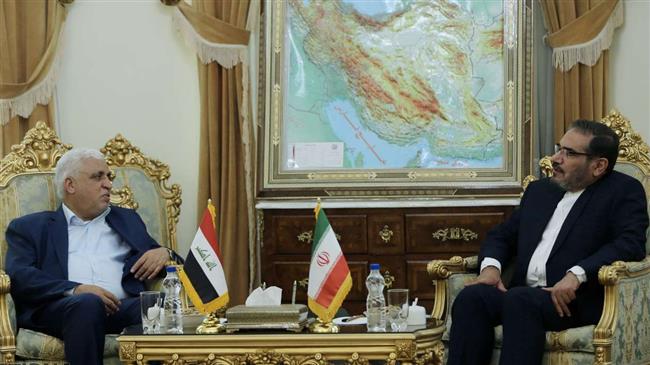
RNA - Secretary of Iran's Supreme National Security Council (SNSC) Ali Shamkhani made the remarks in a meeting with Faleh al-Fayad, the National Security Advisor to the Iraqi Prime Minister Haider al-Abadi, in Tehran on Monday.
“The White House leaders do not even hesitate to shamelessly attack Iraqi and Syrian armed forces in order to support terrorism and those countries that suppose they can ensure their domestic security and regional stability by trusting America are practically bolstering terrorism,” he added.
"An important part of regional crises are led and designed by the US and the Zionist regime (of Israel) in cooperation with certain regional countries," the SNSC secretary pointed out.
However, he said, the Iraqi people have proved that security is not an issue that can be purchased and that they can overcome the "biggest security threats" by relying on their own capabilities instead of trusting foreign powers.
Shamkhani expressed regret that some regional countries claiming to be leader of the Muslim world have become a milking cow for the US and a strategic ally for Israel.
He said the "inexperienced and delusional" governments of these states have adopted ridiculous approaches and are making efforts to cover up their own increasing economic, security and social problems.
The senior Iranian official emphasized that the Islamic Republic has always stood by the Iraqi people, adding that it is Tehran's unwavering stance to support the Iraqi nation's demands in line with the war-ravaged country's development and progress, particularly after the defeat of terrorism.
Nearly a dozen members of Daesh Takfiri terrorist group were killed after Iraqi security forces, supported by pro-government fighters from Popular Mobilization Units, foiled their attacks in the country’s northern oil-rich province of Kirkuk.
Iraqi Joint Operations Command (JOC) spokesman Brigadier General Yahya Rasool said in May that a joint force from Hawijah police and volunteer fighters, better known by their Arabic name Hashd al-Sha’abi, had repelled militant attacks on the villages of Gharib and Hanaf, south of the provincial capital city of Kirkuk, killing 11 extremists in the process, Arabic-language al-Taghier television network reported.
On December 9, 2017, the Iraqi prime minister declared the end of military operations against Daesh in the Arab country.
Seven months later, Abadi formally declared victory over Daesh extremists in Mosul, which served as the terrorists’ main urban stronghold in the conflict-ridden country.
The Iraqi forces took control of eastern Mosul in January 2017 after 100 days of fighting, and launched the battle in the west on February 19 last year.
Daesh began a terror campaign in Iraq in 2014, overrunning vast swathes in lightning attacks.
Iraq will decisively counter any move against solidarity
According to Press TV, the Iraqi official, for his part, said Baghdad heeded measures against regional security and destructive moves by some countries to create instability and insecurity in the country.
Fayad added that Iraq would firmly counter any measure aimed at undermining national integrity and coherence.
He hailed Iran's support for the Iraqi government, people and armed forces in their battle against terrorism and said the Islamic Republic has played a leading role in the anti-terror campaign.
He also called for enhanced cooperation with Iran, particularly in economic and technical sectors, given the two countries' common goals and interests.
847/940